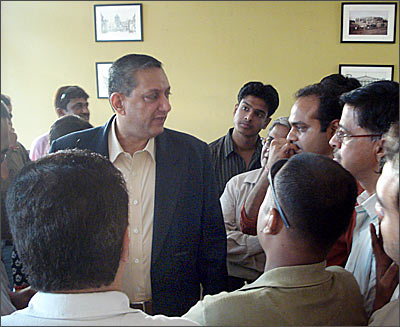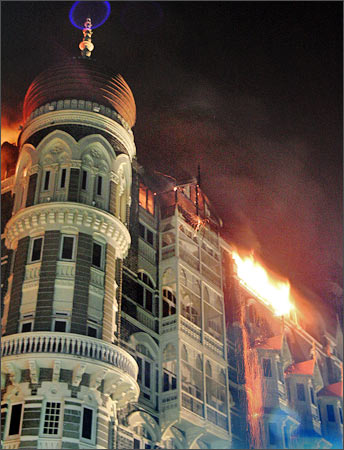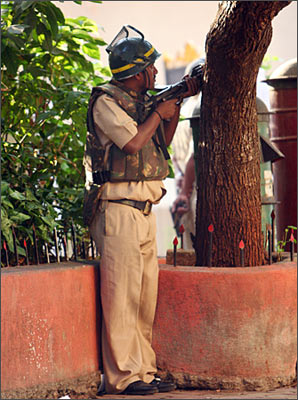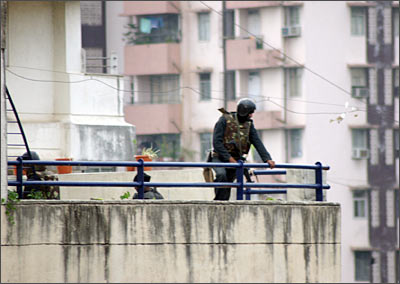
Speaking to the media on Wednesday at the Mumbai Press Club, Joint Commissioner of Police (Crime) Mumbai, Rakesh Maria asserted that, over the past twenty years, the two foremost problems facing the Mumbai police have remained the same: terrorism and organised crime.
But that's about all that hasn't changed, he admitted, as criminals and terrorists are perpetually finding new resources, trying new methods and adapting their means and ends. Where once knives, country-made revolvers and low-power crude explosives ruled the day, today AK-47s, high-intensity Improvised Explosive Devices and hand grenades have replaced them.
Describing the changing face of terrorism, Maria claimed that today the single greatest threat facing Mumbai is the rise of the educated yet indoctrinated terrorist. Unlike the typical terrorist of the 90's, who could be monitored through the Mumbai police's network of informants, the educated terrorist is very elusive and almost impossible to identify.
"(The educated terrorist) doesn't frequent beer bars, visit prostitutes, or go to gambling dens. He has no criminal record, indulges in no other illegal activity, and knows how to cover his tracks. He's intelligent. We have a fabulous informant network, but not for this type of terrorism."
Case in point, the Indian Mujahideen responsible for 2008's Ahmedabad blasts.

He later added, "These are small, close-knit cells that are hard to penetrate. You need your own people to go undercover to develop informants. The task is pretty tough."
In addition to the educated terrorist, Maria identified a new source of worry, the indoctrination that occurs in jails. Saying that this type of terrorist enters jail a petty criminal but leaves indoctrinated in jihad, Maria pointed out that "In the jails we cannot tell who they meet."
Explaining the difficulty of combating terrorism today, Mr Maria added that there was once a close nexus between terrorists and the Mumbai underworld, and that the terrorists were happy to use the readily available underworld infrastructure. But after realising that the police had informants in the underworld, they shifted their methods. Recruiters found Mumbai locals who could be easily indoctrinated and then shipped them to Pakistan and Iran for training, oftentimes through Dubai, before depositing them back in India to wreak havoc.

"In 1998 alone, there were 63 encounters that left 85 gangsters killed," Mr Maria explained. "Because of this preventative action, gangsters fled abroad. Gangs broke up. But now these gangs operate from abroad, and outsource their Mumbai work to 'robber gangs' in the city, who specialise in executing crimes -- extortion, robberies, kidnappings, etc.-- for a price, 'no questions asked'."
Pointing to Mumbai's sheer immensity, Mr Maria said the city 'affords great anonymity', which makes it impossible to keep track of who is coming and going.
These robber gangs are often populated by such transients: poor, rural youth who had migrated to Mumbai in search of jobs. "Everyone thinks of Mumbai as 'the Golden Apple', so they come here. And when they don't find employment, invariable these youths find it more lucrative to enter the criminal word. This is why robberies have increased."
Maria mentioned that many members of the 'robber gangs' come from West Bengal, Bangladesh, Orissa and Bihar.
There's also a new breed of professional criminals, who are based elsewhere but specialise in committing crimes in Mumbai. They arrive, strike and then quickly leave the city and head elsewhere.
To illustrate this point, Mr Maria related a tale about a burglar who stayed at five-star hotels while doing reconnaissance. To identify such a person as a burglar is very difficult, he explained.

In addition to these two ever-evolving problems -- terrorism and organised crime -- Maria also pinpointed several other causes for concern: rise in cyber crime, crimes committed against the elderly, human trafficking and related crimes, white collar crime, middle class crime and vehicle thefts.
Speaking about cyber crime, Maria said that in 2006 there were 159 complaints registered with Mumbai police. That number soared to 775 by 2008. "This is the speed with which cyber crime is growing," Maria said. Popular crimes include credit card fraud, phishing, hacking, and the so-called 'Nigerian Scandal', of which there have been 9 complaints already in 2009 alone.
As for cases of motor vehicle thefts, they rose from 3621 in 2007 to 4068 in 2008, he said. Maria added, with more than a hint of irony, that during the run-up to elections, thefts of certain vehicles -- Scorpios and Taveras, for instance -- go up, as the demand for them in the northern states rises.